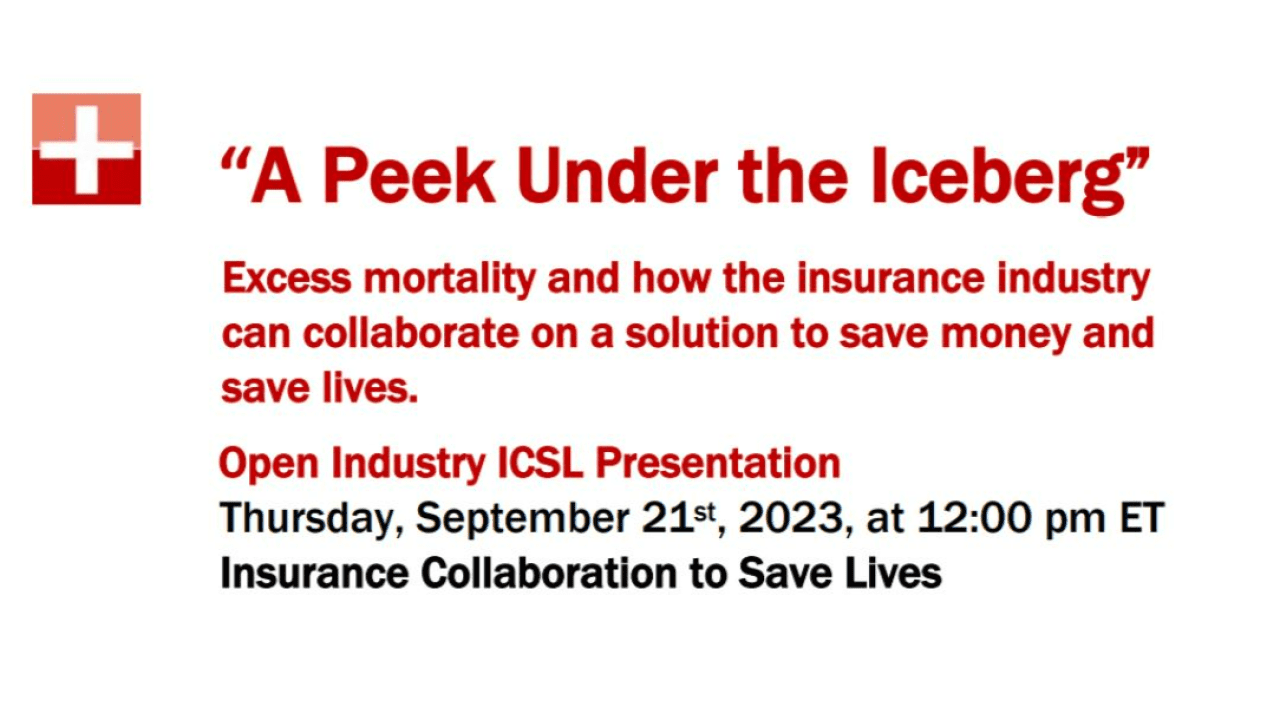About Humaculture, Inc.
View all posts by Humaculture, Inc.
Voluntary benefits & captives: A new paradigm of transparency & control

Join us on Thursday, March 28 from 1:00 to 1:30 CDT for Employee Benefit News’ Web Seminar “Voluntary benefits & captives: A new paradigm of transparency & control.”
Presenters
- Steve Cyboran, ASA, MAAA, FCA, CEBS, actuary and strategy consultant
- Amy Hollis, CEO/Founder at Employees First
- Erik Sossa
- Mimi Leonard
- Allison Itami, Principal at Groom Law Group
Objective
Today, employers face increasing pressure to reduce costs while increasing the value of Total Rewards in an effort to elevate employees’ wellbeing. In this ever-challenging benefits landscape, there is a ground breaking innovation – the pairing of voluntary benefits with captives. This new approach offers exciting solutions, particularly for large-market employers, but first, but it is critical to understand and evaluate the potential opportunities and pitfalls.
Hear from industry leading benefits experts to learn more about…
- the market forces driving these emerging solutions
- the foundational basics – why deliver voluntary benefits through a captive?
- the best practices for evaluating whether these solutions are a “fit” for your organization
- expectations for the future
- why you may not have heard about these solutions until now
Systems Context: “The Systems that Govern Behavior”
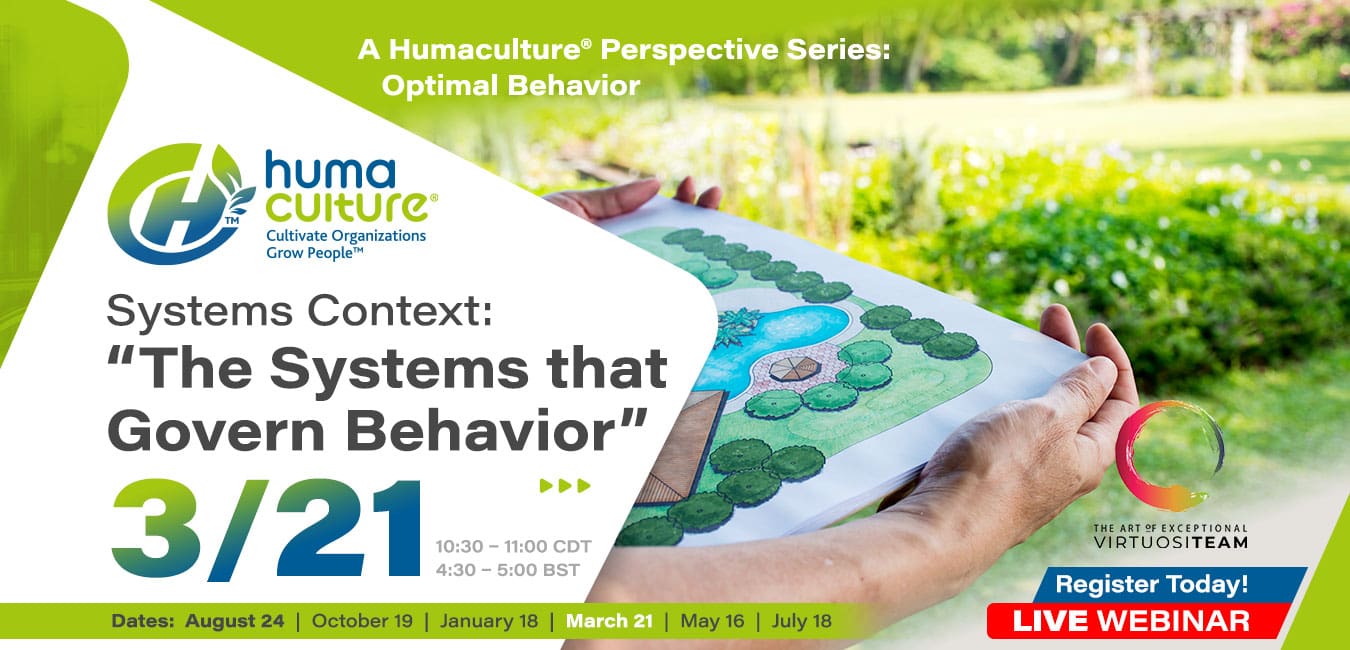
Join us on Thursday, March 21, 2024 from 10:30 to 11:00 CDT for the third webinar in Humaculture, Inc.’s “Optimal Behavior: Making Optimal Behavior the Natural Choice.” You will learn why and how the Systems employed in an Organization impact performance and well-being and how they can be used to grow capabilities, inspire motivation, overcome barriers, and resist temptations to lead to Optimal Behavior.
Presenters
- Steve Cyboran, ASA, MAAA, FCA, CEBS, actuary and strategy consultant
- Wes Rogers, Humaculturist® and strategy consultant
- Colin Bullen, ASA, behavior change actuary
- Hanlie van Wyk, behavior change consultant
Objective
In this fourth session in our series on Optimal Behavior, we explore how the Systems context influences behavior and change. To be able to evolve towards Optimal Behavior, people need to be surrounded by Systems that support them on their journey. The Systems context contains all the tools and guidelines that help us on our way every day. In the workplace these are policies and procedures, enterprise resource management Systems, pay, benefits, and rewards, as well as that curious thing we often refer to as “the way we do things around here.” Anything that signals the optimal way to behave in each Organization. If any of those Systems are misaligned with the Optimal Behavior you’re trying to achieve, your change efforts will fail. The Organizations that recognize this know how to adjust those Systems, including when to bring things into the public eye and when to keep them quiet. They will also be aware that rewards for engagement need to drive intrinsic motivation if the Organization is to develop optimal habits that last.
“A bad system will beat a good person every time.” – W. Edwards Deming
Systems Context to Promote Optimal Behavior Key Takeaways
Join us to learn:
- How ineffective Organizations employ Systems that:
- Limit growth and development
- Lead to discouragement and apathy
- Create unintended barriers or temptations
- How effective Organizations:
- Build habits into processes
- Provide meaningful rewards built on recognition and appreciation
- Balance private correction and open dialogue
Available Support
We are available to support Organizations in the ongoing management of total rewards, compensation and benefit programs including strategy, design, compliance, financial, and monitoring needs. Our team includes business and human relations leaders, finance experts, actuaries, clinicians, behavioral health experts, pharmacy experts, and legal resources to guide you through the strategy, management, and compliance process. Please contact us: [email protected].
Webinar Replay: Context of the Self: “The Complexity of Each Person”
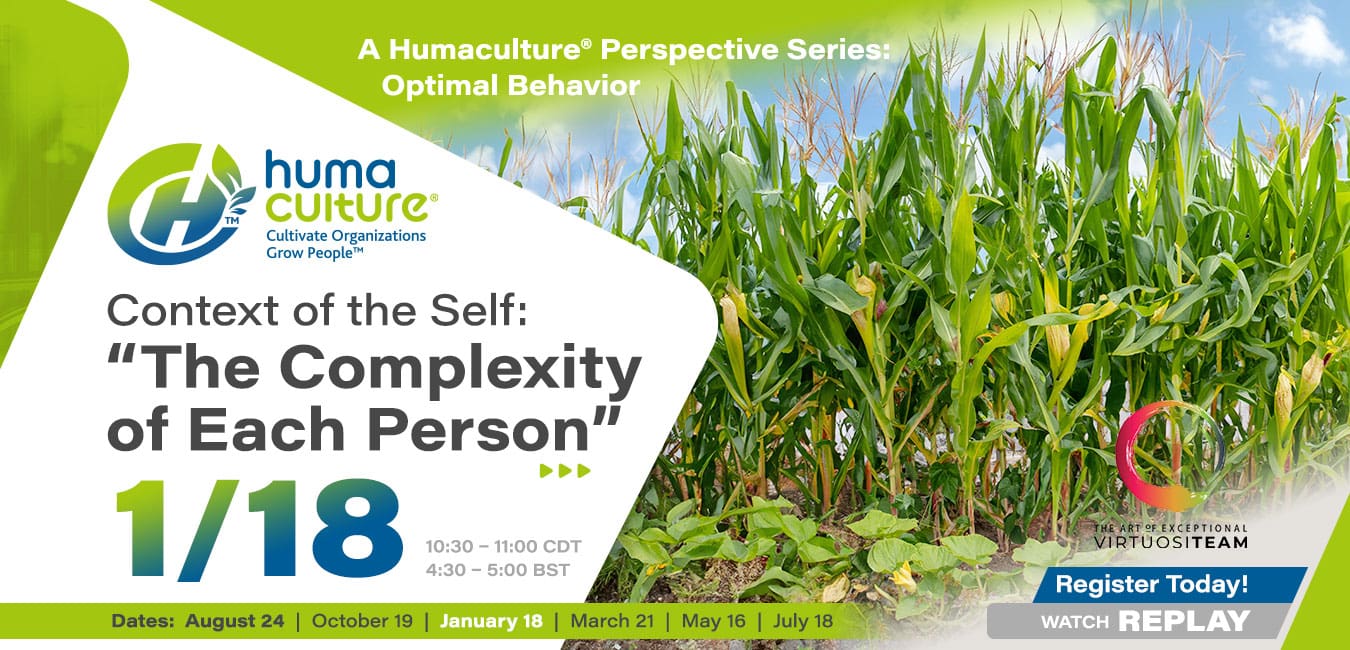
Watch a replay of the third webinar in Humaculture, Inc.’s “Optimal Behavior: Making Optimal Behavior the Natural Choice” to learn why the self can hamper performance and well-being and how to help People to grow capabilities, inspire motivation, overcome barriers, and resist temptations in order to lead to optimal behavior.
Presenters
- Steve Cyboran, ASA, MAAA, FCA, CEBS, actuary and strategy consultant
- Wes Rogers, Humaculturist® and strategy consultant
- Colin Bullen, ASA, behavior change actuary
- Hanlie van Wyk, behavior change consultant
Objective
In this third session in our series on optimal behavior, we explore how the Context of Self influences behavior. To be effective within the Organization, People need to know and manage themselves through their own narrative and understand the same for the People around them. Organizations fail to use narrative stories to connect People to the meaning of changes they are trying to make. Organizations shy away from giving People constructive feedback, yet People need feedback to Grow. Organizations fail to articulate the reason the Organization exists and how People connect with it. To inspire people to perform, Organizational purpose needs to be clear and create emotional attachment, driving motivation. Finally, Organizations associate fun as something that happens outside the workplace and having fun is regarded as unproductive. However, scientists have discovered that it takes approximately 400 repetitions to create a new synapse in the brain, unless it is done in play, in which case it only takes 10 to 20 repetitions.
“The measure of intelligence is the ability to change.” Albert Einstein
Context of Self to Promote Optimal Behavior Key Takeaways
Join us to learn:
- How ineffective organizations:
- Don’t understand how People change behavior
- Don’t Grow Capability and Confidence to change
- Don’t motivate and inspire change
- Don’t recognize how People inhibit sustained behavior change
- How effective organizations:
- Grow competence in change resilience
- Inspire and motivate
- Deploy change sustaining reinforcement tools
Available Support
We are available to support you in your strategy, design, compliance, financial, and monitoring needs. Our team includes business and human relations leaders, finance experts, actuaries, clinicians, behavioral health experts, pharmacy experts, and legal resources to guide you through the strategy and compliance process. Please contact us: [email protected].
Watch
Watch the Career Planning: Effective Pruning Bears Fruit: Manager Development Webinar Replay via Rumble or YouTube.
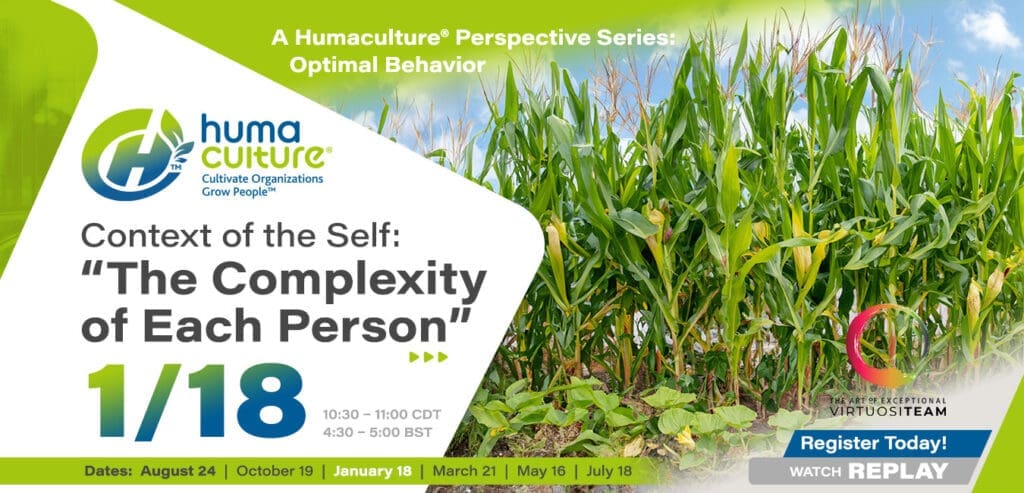
Context of the Self: “The Complexity of Each Person”
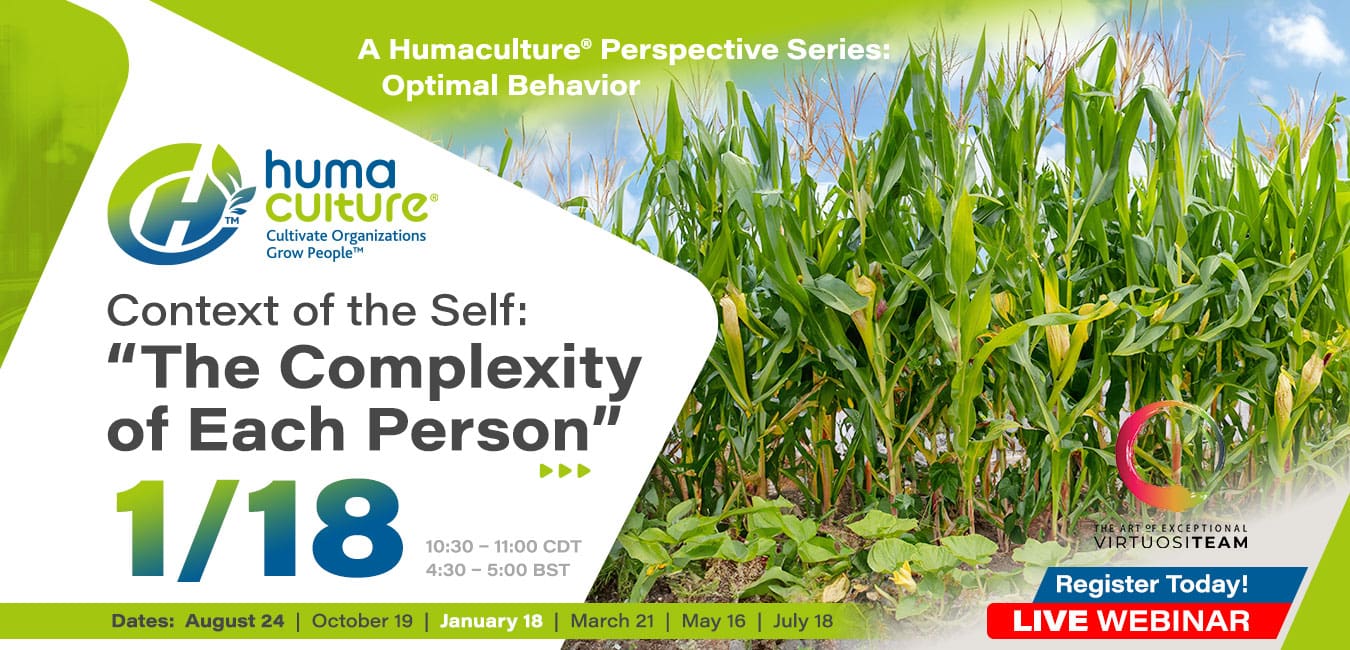
Join us on Thursday, January 18, 2024 from 10:30 to 11:00 CDT for the third webinar in Humaculture, Inc.’s “Optimal Behavior: Making Optimal Behavior the Natural Choice.” You will learn why the self can hamper performance and well-being and how to help People to grow capabilities, inspire motivation, overcome barriers, and resist temptations in order to lead to optimal behavior.
Presenters
- Steve Cyboran, ASA, MAAA, FCA, CEBS, actuary and strategy consultant
- Wes Rogers, Humaculturist® and strategy consultant
- Colin Bullen, ASA, behavior change actuary
- Hanlie van Wyk, behavior change consultant
Objective
In this third session in our series on optimal behavior, we explore how the Context of Self influences behavior. To be effective within the Organization, People need to know and manage themselves through their own narrative and understand the same for the People around them. Organizations fail to use narrative stories to connect People to the meaning of changes they are trying to make. Organizations shy away from giving People constructive feedback, yet People need feedback to Grow. Organizations fail to articulate the reason the Organization exists and how People connect with it. To inspire people to perform, Organizational purpose needs to be clear and create emotional attachment, driving motivation. Finally, Organizations associate fun as something that happens outside the workplace and having fun is regarded as unproductive. However, scientists have discovered that it takes approximately 400 repetitions to create a new synapse in the brain, unless it is done in play, in which case it only takes 10 to 20 repetitions.
“The measure of intelligence is the ability to change.” Albert Einstein
Context of Self to Promote Optimal Behavior Key Takeaways
Join us to learn:
- How ineffective organizations:
- Don’t understand how People change behavior
- Don’t Grow Capability and Confidence to change
- Don’t motivate and inspire change
- Don’t recognize how People inhibit sustained behavior change
- How effective organizations:
- Grow competence in change resilience
- Inspire and motivate
- Deploy change sustaining reinforcement tools
Available Support
We are available to support you in your strategy, design, compliance, financial, and monitoring needs. Our team includes business and human relations leaders, finance experts, actuaries, clinicians, behavioral health experts, pharmacy experts, and legal resources to guide you through the strategy and compliance process. Please contact us: [email protected].
Webinar Replay: Spaces Context: “Grow a Willow in a Desert? The importance of Spaces”
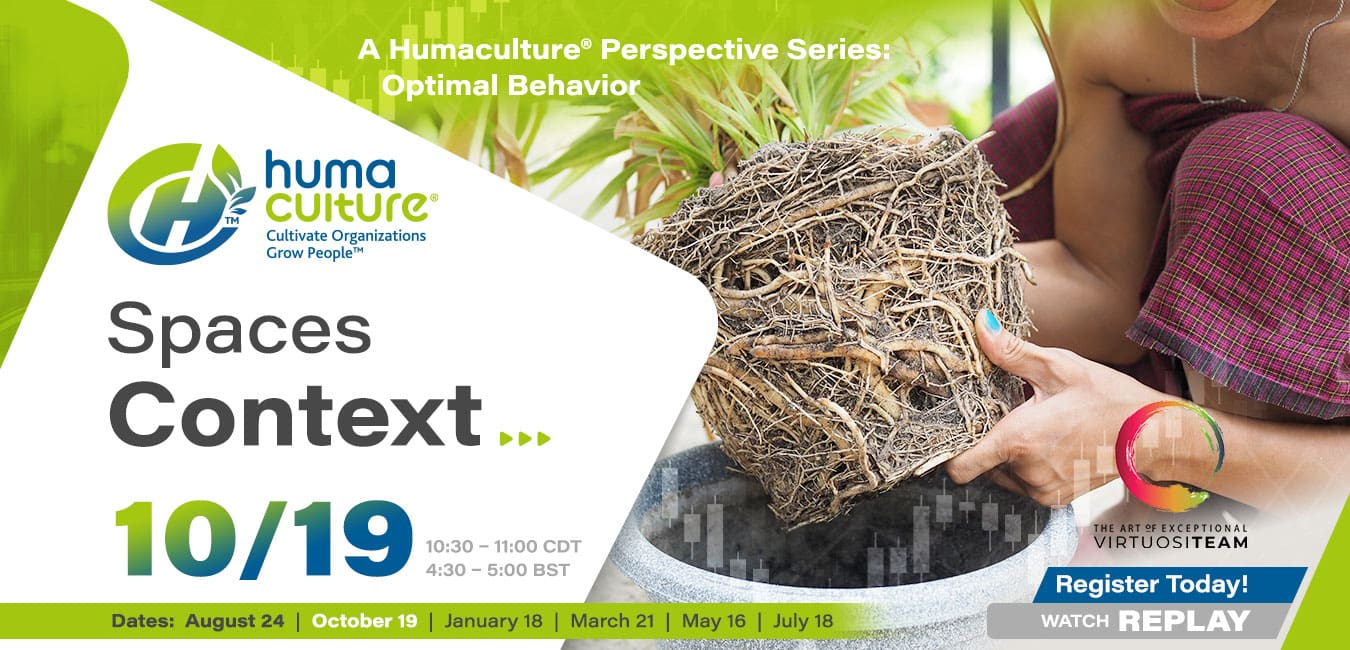
Watch a replay of the second webinar in Humaculture, Inc.’s “Optimal Behavior: Making Optimal Behavior the Natural Choice” to learn why spaces can hamper performance and well-being and how to design your spaces to lead to optimal behavior.
Presenters
- Steve Cyboran, ASA, MAAA, FCA, CEBS, actuary and strategy consultant
- Wes Rogers, Humaculturist® and strategy consultant
- Colin Bullen, ASA, behavior change actuary
- Hanlie van Wyk, behavior change consultant
Objective
In this second session in our series on optimal behavior, we explore how spaces influence behavior. The physical space in which you work can elicit mental and physical reactions that impact positively on performance, mental wellbeing and physical health. Today, physical configuration of buildings reflects a bias toward human energy conservation—and against physical activity, thereby contributing to sedentary behavior which has been linked to nearly all costly lifestyle diseases. In addition, the World Health Organization (WHO) estimates that 30% of new or remodeled office buildings show signs of Sick Building Syndrome (SBS) and that between 10% and 30% of the occupants of these buildings are affected by SBS, e.g. lethargy.
Research further indicates that your physical space can have a positive effect of up to 22% on a range of performance indicators, such as improved concentration, focus, collaboration, learning and cognitive control (working memory, inhibition, and cognitive flexibility). Furthermore, loyalty to an organization is increasingly determined by social and place attachment.
“We shape our buildings, and afterwards, our buildings shape us.” –Winston Churchill
Shaping Spaces to Promote Optimal Behavior Key Takeaways
Join us to learn:
- Why spaces do not support well-being and may lead to sickness
- Why spaces hamper performance
- Why spaces are built counter to tasks
- How effective spaces can be designed to:
- Support healthy behavior and choices
- Improve innovation and performance
- Support efficient task completion
Available Support
We are available to support you in your strategy, design, compliance, financial, and monitoring needs. Our team includes business and human relations leaders, finance experts, actuaries, clinicians, behavioral health experts, pharmacy experts, and legal resources to guide you through the strategy and compliance process. Please contact us: [email protected].
Watch
Watch the Optimal Behavior: Spaces Context: “Grow a Willow in a Desert? The importance of Spaces” via Rumble or YouTube.

Spaces Context: “Grow a Willow in a Desert? The importance of Spaces”
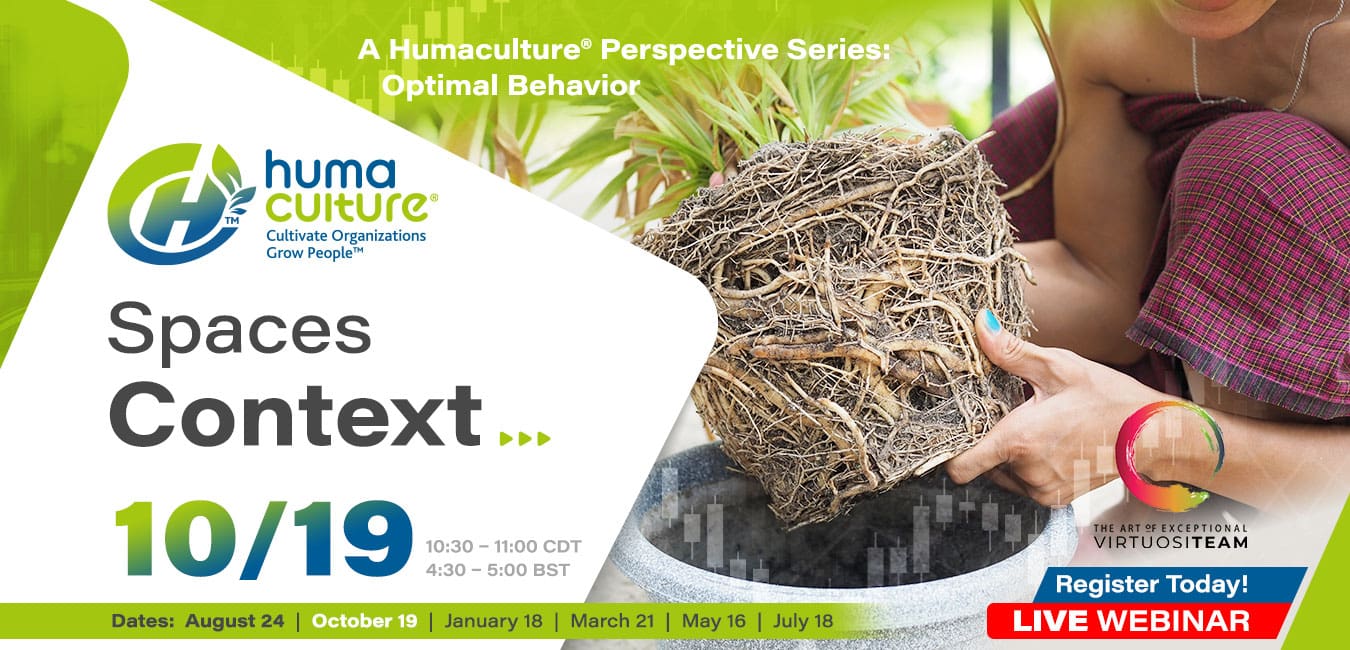
Join us on Thursday, October 19, from 10:30 to 11:00 CDT for the second webinar in Humaculture, Inc.’s “Optimal Behavior: Making Optimal Behavior the Natural Choice.” You will learn why spaces can hamper performance and well-being and how to design your spaces to lead to optimal behavior.
Presenters
- Steve Cyboran, ASA, MAAA, FCA, CEBS, actuary and strategy consultant
- Wes Rogers, Humaculturist® and strategy consultant
- Colin Bullen, ASA, behavior change actuary
- Hanlie van Wyk, behavior change consultant
Objective
In this second session in our series on optimal behavior, we explore how spaces influence behavior. The physical space in which you work can elicit mental and physical reactions that impact positively on performance, mental wellbeing and physical health. Today, physical configuration of buildings reflects a bias toward human energy conservation—and against physical activity, thereby contributing to sedentary behavior which has been linked to nearly all costly lifestyle diseases. In addition, the World Health Organization (WHO) estimates that 30% of new or remodeled office buildings show signs of Sick Building Syndrome (SBS) and that between 10% and 30% of the occupants of these buildings are affected by SBS, e.g. lethargy.
Research further indicates that your physical space can have a positive effect of up to 22% on a range of performance indicators, such as improved concentration, focus, collaboration, learning and cognitive control (working memory, inhibition, and cognitive flexibility). Furthermore, loyalty to an organization is increasingly determined by social and place attachment.
“We shape our buildings, and afterwards, our buildings shape us.” –Winston Churchill
Shaping Spaces to Promote Optimal Behavior Key Takeaways
Join us to learn:
- Why spaces do not support well-being and may lead to sickness
- Why spaces hamper performance
- Why spaces are built counter to tasks
- How effective spaces can be designed to:
- Support healthy behavior and choices
- Improve innovation and performance
- Support efficient task completion
Available Support
We are available to support you in your strategy, design, compliance, financial, and monitoring needs. Our team includes business and human relations leaders, finance experts, actuaries, clinicians, behavioral health experts, pharmacy experts, and legal resources to guide you through the strategy and compliance process. Please contact us: [email protected].
Webinar Replay: Creating the Conditions for Optimal Behavior
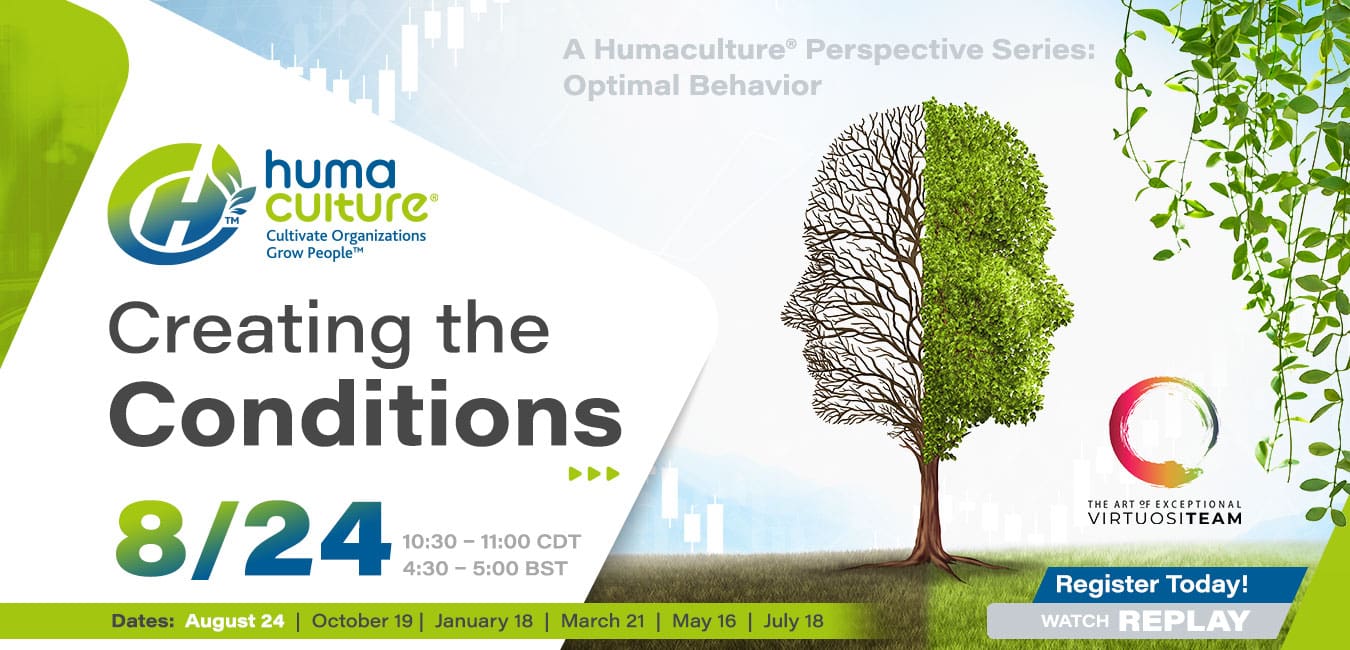
Watch a replay of the first webinar in Humaculture, Inc.’s “Optimal Behavior: Making Optimal Behavior the Natural Choice” to learn why organizations don’t effectively execute change and be introduced to some of the concepts that facilitate optimal behaviors to support a high-performing culture.
Presenters
- Steve Cyboran, ASA, MAAA, FCA, CEBS, actuary and strategy consultant
- Wes Rogers, Humaculturist® and strategy consultant
- Colin Bullen, ASA, behavior change actuary
- Hanlie van Wyk, behavior change consultant
Objective
This is the introductory webinar in our new series on optimal behavior. We explore why people have difficulty in achieving and sustaining change, the difference between short term changes in behavior and long term change through habits, what it takes to achieve optimal behavior in a population, and how to use influence to create a high-performing culture.
Creating the Conditions for Optimal Behavior Key Takeaways
During this session, participants will learn that:
- Why people find it hard to behave optimally
- Why people behave inconsistently
- Why organizations fail to execute change effectively
- How effective organizations:
- Set the contexts to influence behavior
- Understand the powers that influence behavior
- Use influence to create a high-performing culture
Available Support
We are available to support you in your strategy, design, compliance, financial, and monitoring needs. Our team includes business and human relations leaders, finance experts, actuaries, clinicians, behavioral health experts, pharmacy experts, and legal resources to guide you through the strategy and compliance process. Please contact us: [email protected].
Watch
Watch the Career Planning: Effective Pruning Bears Fruit: Manager Development Webinar Replay via Rumble or YouTube.
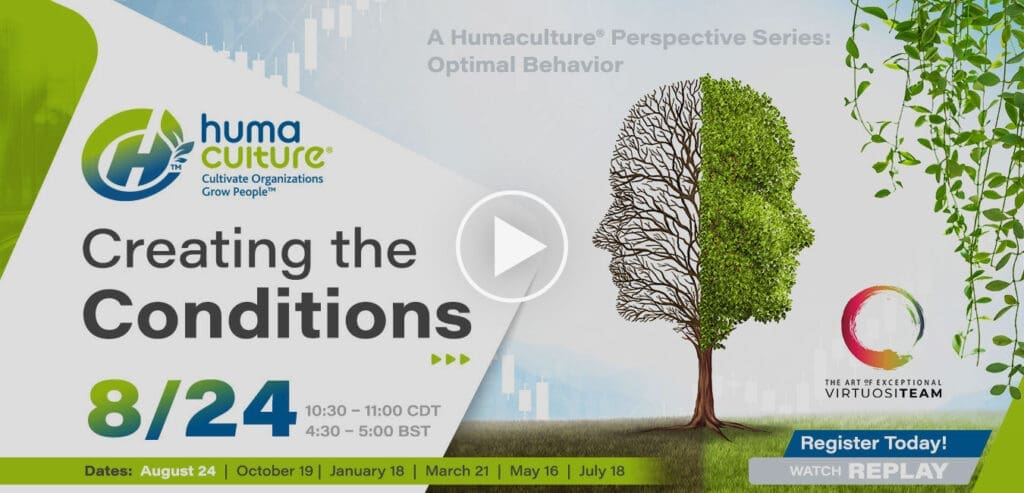
Insurance Collaboration to Save Lives (ICSL): Upcoming Actuarial Presentations

Watch our CEO, Steve Cyboran, present at the following events.
Description: Excess Mortality – A Peek Under the Iceberg
Everyone is attentively watching the current excess mortality and morbidity crisis unfolding. We think it’s just the tip of the iceberg. Join our cross-industry team as we share a proprietary analysis of U.S. and global public health data digging into the underlying problems. Discover the iceberg of health problems underlying the elevated death and disability we see playing out in the bottom line. Can anything be done to slow this train? Risk mitigation strategies for insurers will be explored, with an invitation for participants to exchange ideas within the group. This will be a combination of presentation, panel, and Q&A discussion with multiple presenters including actuaries and other industry experts.
By the end of these sessions, attendees will understand:
- An up-to-date perspective on the current excess mortality and morbidity crisis
- Insight into the myriad of underlying health conditions
- Innovative ideas to improve financial results
Country Relevance: Non-Nation Specific
Experience Level: All levels
Presenters
- Steve Cyboran, ASA, MAAA, FCA, CEBS, CEO, Consulting Actuary, Humaculture, Inc.
- Josh Stirling, Founder of Insurance Collaboration to Save Lives, Insurtech Advisor, Board Director and Former #1 Ranked Insurance Analyst
- Valerie Chezem, ASA, MAAA, Assistant Actuary, Everence®
- Mary Pat Campbell, FSA, MAAA, Vice President, Insurance Research, Conning
- Teresa Winer, FSA, MAAA, Actuary, Office of Insurance and Fire Safety Commissioner, Georgia
August 23 11-12:15 EDT: SOA Life Meeting
- Venue: New Orleans Marriott, 555 Canal St New Orleans, LA 70130-2349
- Conference Page: https://www.soa.org/prof-dev/events/2023-life-meeting/
- Agenda: https://www.soa.org/prof-dev/events/2023-life-meeting/#tab-agenda-selected
September 11 10:30-11:30 EDT: Society of Insurance Research
- Venue: The Westin Cincinnati, Cincinnati, OH
- Conference Page: https://www.sirnet.org/ConferencePage
- Agenda: https://www.sirnet.org/Agenda
September 14 2-3 EDT: SOA Life Meeting Virtual Event
- Location: Online
- Conference Page: https://www.soa.org/prof-dev/events/2023-virtual-life-meeting/#overview-selected
- Agenda: https://www.soa.org/prof-dev/events/2023-virtual-life-meeting/#tab-agenda-selected
October 25 10-11 AM EDT: 2023 SOA ImpACT Conference
- Venue: Indiana Convention Center, 100 S Capitol Ave Indianapolis, IN 46225
- Conference Page: https://www.soa.org/prof-dev/events/2023-annual-meeting-exhibit/
- Agenda: https://www.soa.org/prof-dev/events/2023-annual-meeting-exhibit/#tab-agenda-selected
November 7 12:30-1:30 PM EST: 2023 SOA ImpACT Conference Virtual
- Venue: Online
- Conference Page: https://www.soa.org/prof-dev/events/2023-virtual-impact-conference/
- Agenda: https://www.soa.org/prof-dev/events/2023-virtual-impact-conference/#tab-agenda-selected
Available Support
We are available to support you in your strategy, design, compliance, financial, and monitoring needs. Our team includes business and human relations leaders, finance experts, actuaries, clinicians, behavioral health experts, pharmacy experts, and legal resources to guide you through the strategy and compliance process. Please contact us: [email protected].

